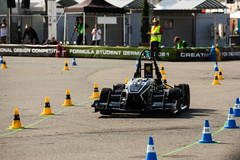To give our readers a general impression about your working conditions, can you tell us how your team is organized?
For my group, the autonomous systems group, we're uniquely organized in the way that we have no specializations within the group; everyone in the group has the same title as autonomous systems engineers, and we work together in an agile team. So, we spend most of our time working together (pair programming) rather than programming on our own projects.

Can you specify your working tools and methods a bit more?
We mainly use GitHub projects, which is an excellent management system for software development projects. Next to this we also use other common tools, like a Kanban board. However, it’s not only about the methods and tools; I think one of the keys to our successful collaboration is that we focus on meeting weekly as well.
How have you implemented this kind of iterative process?
In reality, it's always going to be an individualized version of agile methodology because you can never perfectly follow a book- you have to adapt it to what you need. For us, that means one common backlog for all the issues for the autonomous pipeline. We work in sprints that are two weeks long, and at the end of each sprint, we have a meeting where we go through all the issues we worked on and do a retrospective on what went well, and what didn't go well. With this analysis, we plan the next two weeks and prioritize what needs to be done continuously.
Do you prioritize your tasks together?
100%. So that's one of the key things about having an agile team where we share the workload: our team members are responsible for the pipeline as a whole, not just one particular system. For example, there is a system called SLAM – and many organizations will have a person whose job is to work on the SLAM system only. Since everyone can work on everything in our group, we look through the backlog together at the beginning of each two-week sprint and decide what needs to be done first. Then we allocate who does what. Consequently, that means that on some weeks everyone works on different issues, and on other weeks many people work together on one challenging thing.
Do you set annual goals you focus on?
Yes, of course. Our goal this year was to ensure that the EV/DV merger itself was successful. This means that our focus was improving current systems and developing things in a more reliable, stable, and maintainable fashion.
In comparison with the traditional project management, the agile approach allows flexibility and quick wins on the one hand, but also brings a lot of time pressure with on the other hand. How do you handle this in a volunteer project like the Formula Student is?
It depends, so even though the sprints are two-week long, we have a meeting every week. That means in the middle of a Sprint, we have a short meeting where we just go through the current sprint issues and say where we are with them. Regarding the time investment we ask everyone for, it always depends on the individual group. While some of our team's departments have rigid office hours, it didn’t work for us. Instead, we try our best to be present at the office, even if we’re doing things that might not be related to Formula Student all the time. For example, I am at the office every single day from morning to night, but I do my schoolwork at the office as well. So even though I might not be working on the project, my team members can still go: Hey Gina, can I talk to you about this? So, our collaboration is based on just being around each other a lot and talking, having lunch, and socialising. However, in this context, we also should mention that we are very thankful for our excellent working spaces and facilities.


